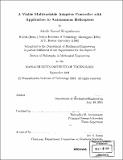| dc.contributor.advisor | Anuradha M. Annaswamy. | en_US |
| dc.contributor.author | Krupadanam, Ashish Samuel, 1974- | en_US |
| dc.contributor.other | Massachusetts Institute of Technology. Dept. of Mechanical Engineering. | en_US |
| dc.date.accessioned | 2011-11-18T20:55:22Z | |
| dc.date.available | 2011-11-18T20:55:22Z | |
| dc.date.copyright | 2001 | en_US |
| dc.date.issued | 2001 | en_US |
| dc.identifier.uri | http://hdl.handle.net/1721.1/67169 | |
| dc.description | Thesis (Ph. D.)--Massachusetts Institute of Technology, Dept. of Mechanical Engineering, 2001. | en_US |
| dc.description | Includes bibliographical references (p. 116-122). | en_US |
| dc.description.abstract | Autonomous helicopters carry out missions in inaccessible hazardous environments. Their performance capability in speed, maneuverability and trajectory tracking must be comparable, if not superior, to manned vehicles. Control laws that meet desired performance specifications are difficult to design because of the uncertain, fully-coupled nonlinear dynamics of autonomous helicopters. Uncertainties in helicopter parameters not only change the dynamics of the system but the trim inputs themselves. Many of the current control designs assume low speeds and neglect aerodynamics as well as uncertainties in system parameters. As a result, these linear and nonlinear controllers are adequate at best at hover, and therefore not viable in real plants, as the unknown trim conditions and dynamics result in severe performance degradation even at moderate speeds. For an autonomous vehicle control system to be viable, it must accommodate uncertainties in the trim conditions on-line, the effect of the aerodynamics, and parametric uncertainties, for various realistic maneuvers beyond hover. This thesis presents a viable multivariable adaptive control design methodology that is applicable to the needs of uncertain plants and high bandwidth requirements. Control in the cases where the full and partial state variables are available for measurement are considered. A systematic control design procedure that fully accommodates the aerodynamics of the autonomous vehicle is developed. The principal features of the proposed controller are the following: The multivariable adaptive controller accommodates both parametric uncertainties and unknown trim conditions through on-line adjustment of appropriate control parameters. | en_US |
| dc.description.abstract | (cont.) parameters. Closed-loop stability and robustness are demonstrated through the use of suitable Lyapunov functions. Judicious integration between linear robust control methods and online adaptive strategies is incorporated in the control design to maximize off-line information about the nominal conditions and on-line measurements. A two-step nonlinear optimization procedure is carried out to determine nominal trim states that allows the arbitrarily close convergence to the global minima by making use of prior information available about sub-components of the trim states during a given maneuver. The control design methodology is tested on a high fidelity simulation of a Draper Laboratory autonomous helicopter. Extensive simulation studies were carried out, beginning from a vehicle model that includes complete vehicle aerodynamics, gravitational and inertial effects, rotor dynamics, and rotor-vehicle interactions. Five different inputs including the roll-cyclic and pitch cyclic angles of the main rotor, the pedal command for the tail rotor, collective pitch angle for the main rotor, and the throttle are assumed to be present. The controller is evaluated at various operating conditions and maneuvers where aerodynamic nonlinearities and parametric uncertainties become dominant. Simulations are performed on a nonlinear longitudinal dynamics model to track step and sinusoidal changes in forward flight velocity, and a maneuver involving jumps over hurdles. Simulations on the full three dimensional nonlinear helicopter model are performed for vertical flight and coordinated turn maneuvers ... | en_US |
| dc.description.statementofresponsibility | by Ashish Samuel Krupadanam. | en_US |
| dc.format.extent | 122 p. | en_US |
| dc.language.iso | eng | en_US |
| dc.publisher | Massachusetts Institute of Technology | en_US |
| dc.rights | M.I.T. theses are protected by
copyright. They may be viewed from this source for any purpose, but
reproduction or distribution in any format is prohibited without written
permission. See provided URL for inquiries about permission. | en_US |
| dc.rights.uri | http://dspace.mit.edu/handle/1721.1/7582 | en_US |
| dc.subject | Mechanical Engineering. | en_US |
| dc.title | A viable multivariable adaptive controller with application to autonomous helicopters | en_US |
| dc.type | Thesis | en_US |
| dc.description.degree | Ph.D. | en_US |
| dc.contributor.department | Massachusetts Institute of Technology. Department of Mechanical Engineering | |
| dc.identifier.oclc | 50139912 | en_US |
